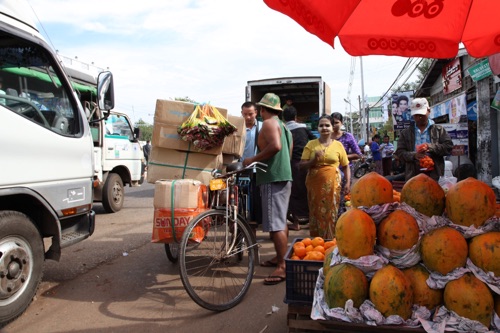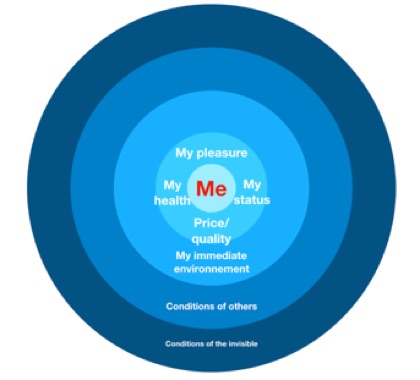News
5 April 2020
The selfish, the blind and the invisible: what COVID-19 tells us about our societies
In this period of lockdown, many of us take more time to be better informed.
There are at least two reading levels of the mass of information that submerges us on the theme of COVID-19:
-
•The first is a literal reading - raw information on the virus, number of sick and death toll, availability or not of drugs, etc.
-
•The second is a critical reading that tells us something about ourselves and our perception of the world around us.
Let’s focus on this second reading and limit the field of our discussion to the relation between COVID-19 and food, to begin with.

What does it say about our societies?
Selfish
First of all, it says that we are selfish, as our prime concern is self-interest. To find evidence to support this statement, all we have to do is to make an internet search using as key worlds “COVID-19” and “food”. Give it a try and see the result.
There are good chances that the articles that will appear on top of the list will tell you about:
-
•How to avoid that food becomes a source of infection by the virus (how to wash it? How to cook it? …) [read here and here]
-
•What are the risks of having food delivered at home? (The danger for us and not for the delivery boy who brings it, whose situation is of no real importance to us…)[read]
-
•What should we eat to protect us more effectively from the virus? (!)
-
•Is there going to be a lack of food because of COVID-19? [read]
It is the risk of food shortage that is highest on the agenda of our media and also of our governments, as well as of most international organisations, some of which “use this opportunity” to glorify international trade as the remedy that will help to solve local food shortages and criticise the impulse to establish border restrictions [read here and here]. Even the High-Level Panel of Experts on Food Security and Nutrition, who would be expected to be dealing with all dimensions of food security, focuses most of its note on the COVID-19 on the risk of food shortage [download file Impact of COVID-19 on Food Security and Nutrition (FSN).pdf].
How should we interpret this evident bias in concerns? Certainly by some kind of egotism, if not selfishness that makes that those who write emphasise mainly their own fears who are those of people who generally do not have any difficulty in acceding food, as they belong to the middle and upper classes of our society, and who are mostly preoccupied by their self-interest and that of their immediate circle.
This is probably something that can be understood. Most of us are most affected by what impacts us directly. This may be normal, but it can be discussed. This becomes an issue when even a moderate selfishness makes us blind, so blind that we are unable to be concerned with problems experienced by others that are often, particularly in the current crisis, a matter of access to food, either because it has turned too dangerous for these people to leave their homes to purchase their food, or because they do not have the financial means to do this.
Blind
It seems that only those who are directly involved in helping persons in need are able to see them [read here and here], not always, however. In some cases, they are more concerned with their capacity to continue their usual food assistance activities or to purchase required supplies under lockdown conditions [read in French]. In frequent cases, they lack the awareness of the fact that the lockdown creates new vulnerabilities that will necessitate not just maintaining activities but developing them.
To be really conscious of this, it may be important to live in countries where these vulnerable groups are so numerous that they become quite visible [read in French] or to be better informed, through work, on conditions existing in poor countries [read] or in the “fourth world” of rich countries. But even in this case, there is high risk to believe that what matters most is to maintain routine activities and to fail to see the coming of a huge wave of very vulnerable people [read].
Invisible
However, little by little, the crisis makes people aware of the existence of two main categories of “invisible”:
-
•In rich countries (mainly but not exclusively), the invisible make the system work and their presence is taken for granted and is so normal that they are not seen any more by others; if ever they are seen, it is only their functions that are visible, not the people that hide behind them: the supermarket cashier, the postman, the garbage collector, the delivery boy whom we regularly meet, and those more remote like the technicians who ensure availability of electricity and many other very important services as well as all those who produce the goods indispensable to us in our daily life… They are generally poorly treated, work in difficult conditions and are poorly paid. Health personnel, whom we cheer every evening, and, very important, all those who make it possible for them to work, may also be added here: their working and living conditions are not in proportion with the services they provide and this must be reconsidered.
-
•In poor countries (mainly but not exclusively) a large numbers of precarious street workers, from water carriers to cola nut selling girls, including a mass of individuals peddling anything from food to paper tissues and lighters [read], are deprived, in a lockdown situation, from any source of income. This puts them in danger if no assistance is given to them and if, in the future, they are not granted access to a minimum of economic security and social protection.
Yes indeed, the COVID-19 crisis illustrates very well how we have been conditioned to think as consumers and not as citizens.
An “ideal” consumer’s world vision

(Inspired by work of a group of students
on the factors determining consumer choice - 2019)
Download diagram: Consumer.jpg
It is needless to add much text here to this simple diagram to see how this profile of an “ideal” consumer is consistent with what the current crisis tells us, to realise that this had already been suggested by the environmental and climatic crisis, and to understand that it is one of the sources of our problems [read].
Let’s now broaden our perspective and consider another aspect highlighted by the COVID-19 crisis that speaks of blindness and invisibility. We have been convincing ourselves for more than two centuries [read] that the market can solve everything in the most efficient way to the extent that, for three or four decades, we have tended to rely on it without attempting to anticipate the future proactively and have looked down upon any attempt to analyse longer term perspectives. The level of unpreparedness of our health systems in case of a pandemic that had however been forecasted by researchers is frightening [read one example], all the more as we have accepted to depend on one unique strategy of prevention, vaccination, that, useful as it is, does not make it possible to face a new disease like COVID-19 and has led us to invest less in health systems.
Worse, we realise now that we have lost the capacity to plan and the will to try and anticipate the consequences of the pandemic. For example, it is quite extraordinary that no-one had been able to foresee that by multiplying by more than 5 the number of patients in intensive care, there would be a risk of shortage of medicine required for them! Is it not blindness - or maybe simply gross incompetence - to become aware of this issue when, in places, stocks of these products are so low that they only represent needs for a few days? (Three days in some hospitals according to what health personnel representatives said when interviewed on the media the day before yesterday.)
This highlights the necessity of combatting what could be defined as “market fatalism” and of restoring our capacity in order to plan our actions for facing successfully our sanitary, ecological, social and economic challenges rather than relying on the supposed ability of the market to solve everything, a market that proves to be quite ineffective in this period of crisis.
One question
The question is therefore the following: “How can we change our vision of the world and take back control for coping with the challenges we face?” Many historians have been saying that the 20th century started in 1914. It is up to us, now, to make sure that the 21st century really starts in 2020…
An issue on which to meditate while we are locked in our homes…
—————————————
To know more :
-
•M. Torero, Novel coronavirus COVID-19 | Food supply chains under strain, what to do? FAO, 2020 (video).
-
•High-Level Panel of Experts on Food Security and nutrition, Impact of COVID-19 on Food Security and Nutrition (FSN).pdf, Interim Issue Paper, Committee on World Food Security, 2020.
-
•Azevêdo sees sharp fall in trade, calls for global solutions to COVID-19 crisis, WTO, 2020.
-
•Bhattarai, A. and L. Reiley, The companies that feed America brace for labor shortages and worry about restocking stores as coronavirus pandemic intensifies, The Washington Post, 2020.
-
•Welsh C., COVID-19 and Food Security - What You Need to Know. Center for Strategic & International Studies, 2020.
Selection of past articles on hungerexplained.org related to the topic:
-
•COVID-19 and food - The pandemic is likely to cause a major food crisis, 2020.
-
•Opinion : Back to reality - Reflections around the COVID-19 crisis, 2020.
-
•Life plagued by human madness: we must change our paradigms, objectives and values, 2019.
-
•US Food and Agriculture: present and (perhaps) future situation, 2017.
Last update: April 2020
For your comments and reactions: hungerexpl@gmail.com


